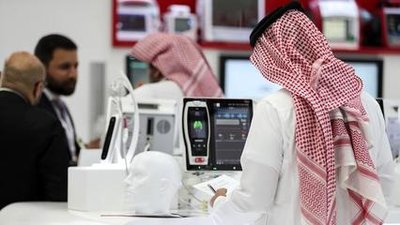
In the context of the global economy, the economic development of various countries is inevitably influenced by various factors. Recently, the first quarter economic data released by Saudi Arabia (hereinafter referred to as Saudi Arabia) has attracted widespread attention. Data shows that Saudi Arabia's actual gross domestic product (GDP) has decreased by 1.7% year-on-year, with a particularly significant decline in the oil sector. This change not only reflects the short-term challenges facing the Saudi economy, but also reveals certain deep-seated issues in the global economic landscape.
Firstly, we need to understand that as an oil exporting country, Saudi Arabia's economy largely relies on the development of the oil industry. However, in recent years, the volatility of the global oil market has intensified, coupled with the impact of the COVID-19 epidemic on the global economy, the Saudi oil industry is facing unprecedented challenges. Therefore, the phenomenon of Saudi Arabia's real GDP declining by 1.7% year-on-year in the first quarter is closely related to the 11.2% decline in real GDP in the oil sector.
The contraction of the oil sector has had a significant impact on the overall economy of Saudi Arabia. Due to the fact that the oil industry is the backbone of Saudi Arabia's economy, its contraction directly leads to a decrease in national fiscal revenue, which in turn affects the government's investment in infrastructure construction, social welfare, and other aspects. In addition, the contraction of the oil industry has also led to a decrease in employment opportunities, exacerbating social pressure within Saudi Arabia.
However, despite the poor performance of the oil sector, Saudi Arabia's non oil sector achieved a real GDP growth of 3.4%. This data indicates that while facing challenges, the Saudi economy has also shown some resilience. The growth of the non oil sector is mainly due to the economic diversification policies implemented by the Saudi government in recent years. In order to reduce dependence on the oil industry, the Saudi government actively encourages the development of non oil industries such as manufacturing and services, and has achieved certain results.
So, how should Saudi Arabia respond to such an economic situation?
Firstly, Saudi Arabia needs to continue promoting its economic diversification strategy. Although the oil industry remains an important pillar of the Saudi economy in the short term, excessive reliance on the oil industry will undoubtedly increase economic risks in the long run. Therefore, Saudi Arabia should increase investment in non oil industries such as manufacturing and services, cultivate new economic growth points, and reduce dependence on the oil industry.
Secondly, Saudi Arabia needs to strengthen cooperation and exchanges with the global economy. In today's world of economic integration, no country can stand alone. Saudi Arabia should actively participate in international economic cooperation, strengthen trade with other countries, expand export markets, and alleviate domestic economic pressure.
In addition, Saudi Arabia should also pay attention to domestic livelihood issues and improve people's living standards. The ultimate goal of economic development is to improve people's lives. Therefore, the Saudi government should increase investment in social welfare, improve public service levels, alleviate social conflicts, and create a favorable social environment for sustainable economic development.
Of course, we should also note that a 1.7% year-on-year decrease in Saudi Arabia's real GDP in the first quarter does not necessarily mean that its economy has fallen into a predicament. On the contrary, this data more reflects the volatility and challenges of the Saudi economy during its transformation process. As long as we face these issues head-on and take effective measures to solve them, the Saudi economy is still expected to achieve stable and sustainable development.
Finally, we need to emphasize that the economy is a complex system, and its development is influenced by multiple factors. Therefore, when analyzing and evaluating the Saudi economy, we should take a comprehensive and objective view of the issues, not only recognizing the challenges and difficulties it faces, but also recognizing its potential and opportunities. Only in this way can we more accurately grasp the current situation and future development trends of the Saudi economy, and provide strong support for the formulation of relevant policies.
In summary, although Saudi Arabia's real GDP in the first quarter decreased by 1.7% year-on-year, this data has attracted widespread attention, but there is no need to be overly pessimistic. As long as Saudi Arabia faces the problem, actively responds, and continues to make efforts, the Saudi economy is still expected to achieve more stable and sustainable development. At the same time, we also look forward to Saudi Arabia continuing to promote its economic diversification strategy in the future, strengthening cooperation and exchanges with the global economy, and making greater contributions to global prosperity and stability.

Since 2022, the Fed has cumulatively reduced its balance sheet by $2.4 trillion through quantitative tightening (QT) policies, leading to a near depletion of liquidity in the financial system.
Since 2022, the Fed has cumulatively reduced its balance sh…
On December 11 local time, the White House once again spoke…
Fiji recently launched its first green finance classificati…
Recently, the European Commission fined Musk's X platform (…
At the end of 2025, the situation in the Caribbean suddenly…
The U.S. AI industry in 2025 is witnessing a feverish feast…